Key takeaways:
- Zero-based budgeting emphasizes intentional spending by assigning every dollar a specific purpose, promoting accountability and adaptability.
- Finance mobile apps enhance budgeting by providing real-time tracking, educational resources, and customizable features that cater to individual needs.
- Creating a zero-based budget involves breaking down income and expenses into manageable categories, allowing for flexibility and a focus on financial goals.
- Regularly tracking progress brings awareness to spending habits and encourages adjustments, transforming budgeting into a personal growth journey.
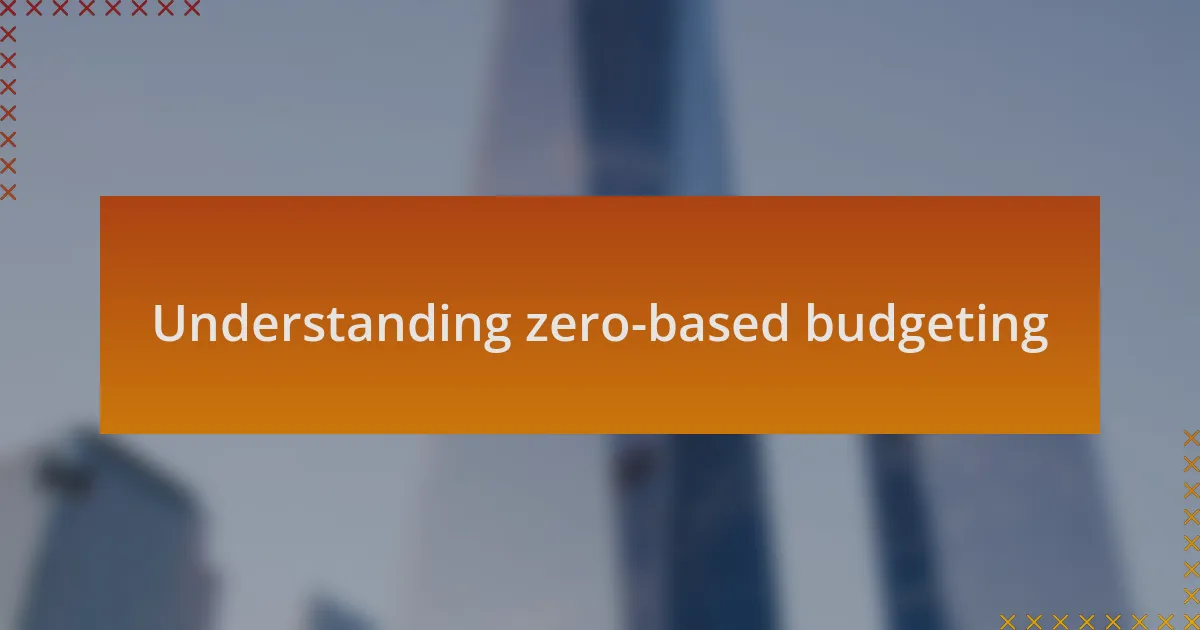
Understanding zero-based budgeting
Zero-based budgeting, at its core, is about assigning every dollar a specific job, essentially starting from a “zero base” each month. When I first tried this method, it was eye-opening to see where my money truly went. I remember feeling a mix of empowerment and anxiety as I realized I needed to account for every single expense, down to the last cent.
One of the most striking aspects of zero-based budgeting is its emphasis on intentional spending. I often asked myself, “What do I truly value?” This approach transformed my financial habits, forcing me to confront wants versus needs. For instance, I initially balked at cutting my coffee shop visits, but when I noted how much those little splurges added up, I found myself excited to brew my own coffee at home – a small change that made a significant impact on my budget.
In addition, this budgeting method fosters adaptability. Each month, my budget looked different based on my needs and goals. I remember the relief I felt when I realized I could adjust my allocations, moving funds around as life’s demands shifted. Have you ever felt stuck in a rigid budgeting plan? With zero-based budgeting, the flexibility truly helps keep you engaged and responsive to your financial situation.
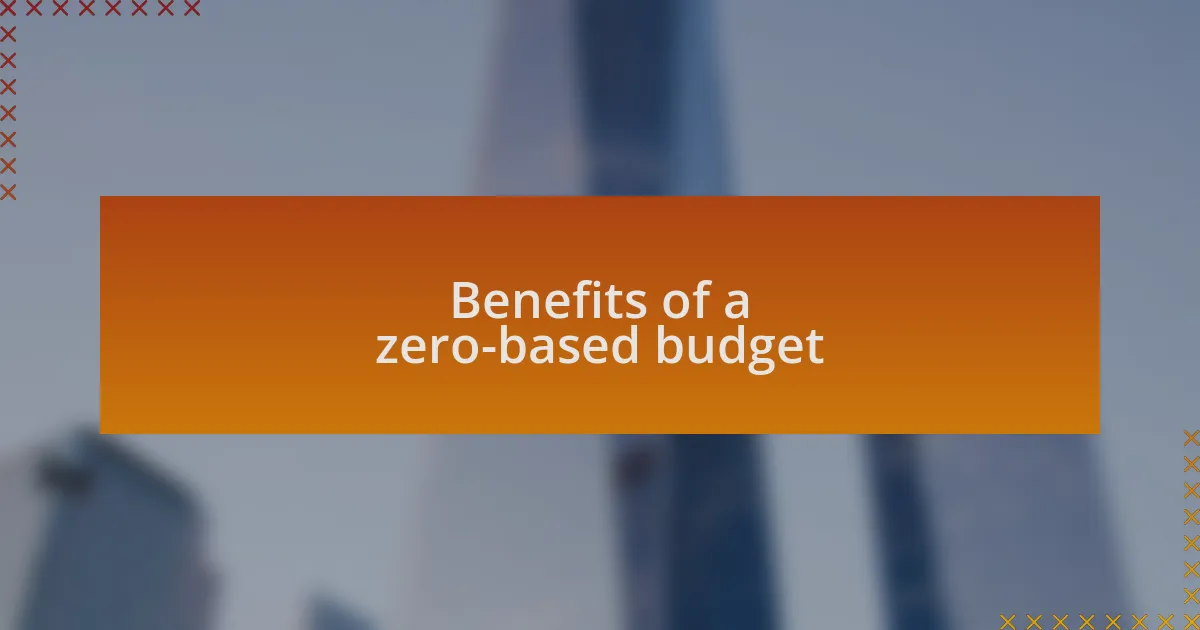
Benefits of a zero-based budget
Managing my money became a more rewarding experience once I embraced zero-based budgeting. I discovered that every dollar assigned a purpose created a sense of control over my finances. On a tight month, I could pinpoint where to allocate my money more effectively, which taught me invaluable lessons about prioritization. Have you ever felt overwhelmed by bills piling up? By knowing my budget inside and out, I found a peace of mind that I hadn’t experienced before.
Another significant benefit is the clarity it brings to my financial goals. I remember setting a savings goal for a vacation, and with zero-based budgeting, I was able to allocate specific funds each month towards that dream. Watching my savings grow every week fueled my motivation. It felt rewarding to both save for something I wanted and track my progress meticulously. Isn’t it gratifying to see hard-earned money work towards fulfilling your dreams?
Finally, I cannot underestimate how this approach encourages accountability. When I transitioned to zero-based budgeting, I held myself responsible for each dollar spent. It was eye-opening to reflect on my spending stories each month. I asked myself, “Did this expense align with my goals?” If I couldn’t answer affirmatively, it prompted a deeper examination of my habits. Have you ever found yourself questioning your spending choices? This budget framework pushed me to become more intentional about my financial behavior, leading to healthier spending habits.
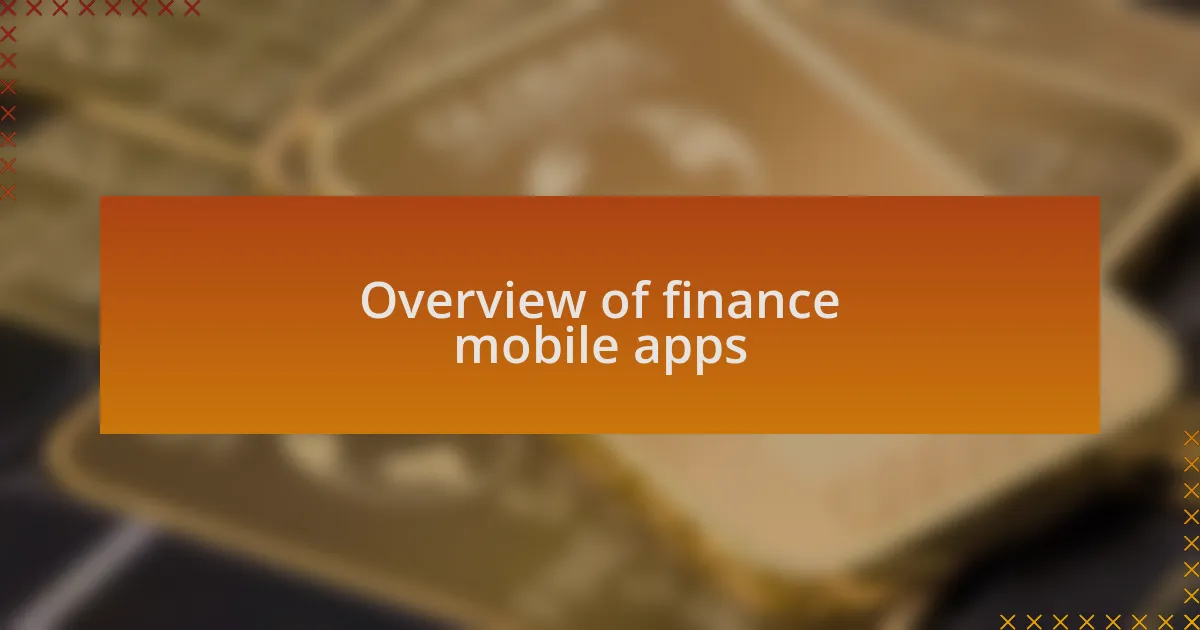
Overview of finance mobile apps
Managing finances can feel overwhelming, but finance mobile apps provide a practical solution. From my experience, these apps simplify budgeting by offering real-time tracking of expenses and income. I vividly recall using one of these apps during an unexpected car repair; it helped me see where I could pull funds from other categories without derailing my budget. Have you ever wished for a tool to effortlessly organize your finances?
In addition to tracking expenses, finance mobile apps often feature budgeting tools that cater to specific needs, such as saving goals or debt repayment plans. I remember setting up a savings challenge within my app, making it almost game-like. It turned spending and saving into a fun challenge rather than a chore. Could transforming budgeting into a more engaging experience change your perspective on finances?
Moreover, many finance mobile apps come equipped with educational resources and tips, which I found invaluable. When I first started budgeting, I often felt lost amid all the terminology. However, these apps have a way of breaking down complex concepts into bite-sized tutorials that make financial literacy accessible. Have you ever felt intimidated by finances, thinking it’ll never be simple? With the right app, that intimidation can quickly fade away.
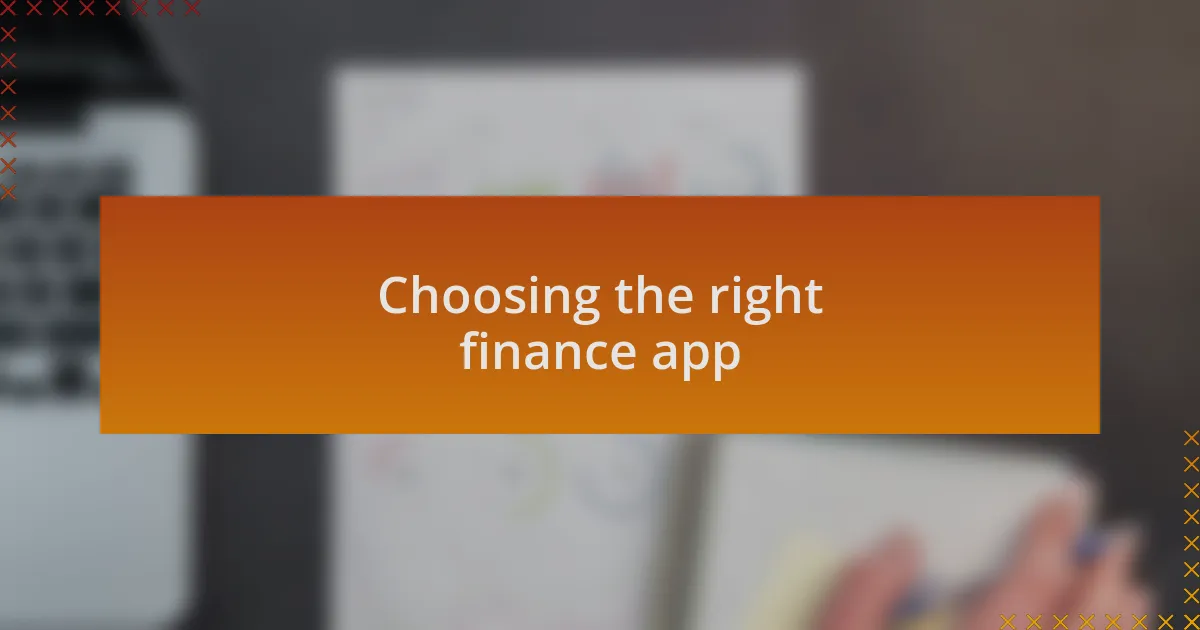
Choosing the right finance app
When I first set out to choose a finance app, I thought I needed something flashy and feature-rich. However, I quickly realized that simplicity was key. I remember downloading an app that was highly rated for its user interface but ended up being overly complicated. Have you found yourself in a similar situation, captivated by the reviews only to feel frustrated later? Sometimes, the best choice is an app that intuitively suits your needs, rather than one that boasts every feature under the sun.
Another crucial factor I considered was the app’s ability to sync with my bank accounts securely. I distinctly recall the moment I linked my accounts for the first time and watched my spending habits come to life on screen. It was both eye-opening and scary! Does seeing your spending in one place make you anxious, or does it motivate you to change? That level of transparency was incredibly helpful for me, driving me to take action and adjust my budget accordingly.
Lastly, I found community feedback invaluable when making my final choice. I often skimmed through forums and social media comments, connecting with users just like myself. It’s interesting how a simple comment from someone about their positive experience with an app can sway your decision, right? I remember one user mentioning how a particular app offered customized reminders that helped them stick to their financial goals. That really resonated with me since accountability was something I was seeking on my journey to a zero-based budget. Are you ready to find the app that will help you on your financial journey?
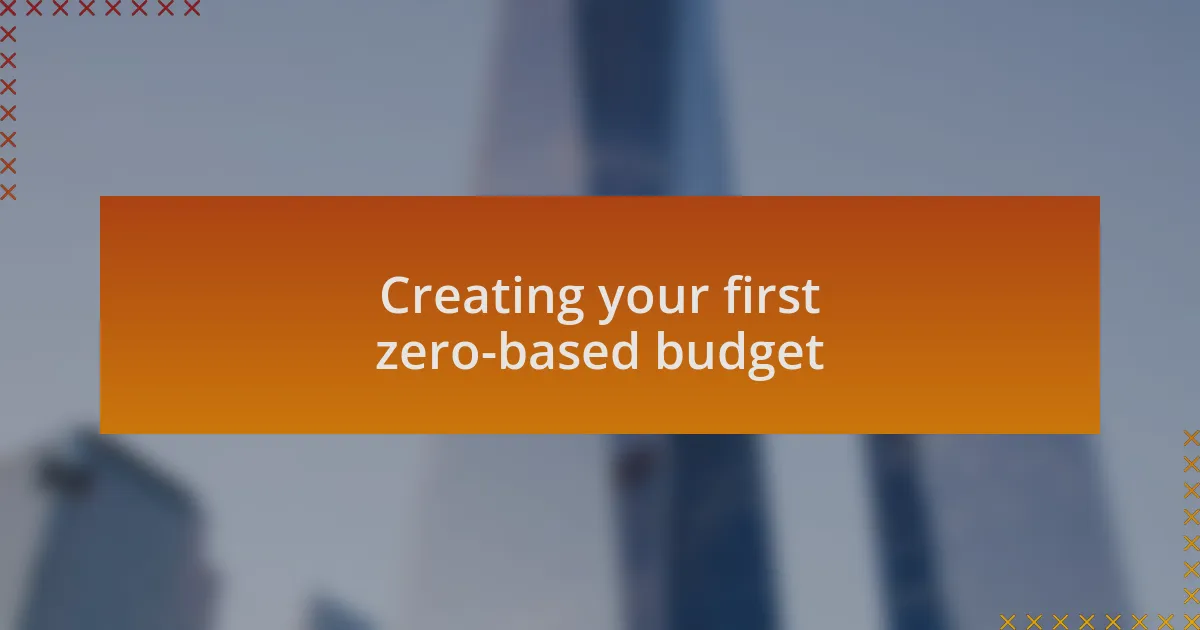
Creating your first zero-based budget
Creating your first zero-based budget can be both exciting and daunting. I vividly remember my first attempt; it felt a bit like assembling a puzzle without having all the pieces. The concept was simple: every dollar I earned had to have a purpose, whether it was for bills, savings, or fun. But initially, I struggled to categorize my expenses accurately. Have you ever had that overwhelming feeling of staring at the numbers and wondering where to even begin?
One strategy that worked well for me was breaking down my monthly income into smaller, more manageable sections. I would allocate funds for fixed expenses like rent, then tackle variable costs such as groceries or entertainment. By using my app to track these categories visually, I felt more in control. Do you find it easier to manage your finances when you have a visual representation of your spending? That realization transformed my budgeting process and made it feel less restrictive.
A pivotal moment for me was when I realized I needed to incorporate not just my necessities but also my financial goals. I vividly recall adjusting my budget to include a savings category for a trip I had been dreaming of. This simple shift allowed me to see budgeting not as a limitation but as a pathway to opportunities. Have you ever felt inspired by a financial goal? That motivation drove me to stick with my zero-based budget and ultimately transformed my financial habits for the better.
![]()
Tracking progress and adjustments
Tracking my progress with a zero-based budget was eye-opening. I started using my finance app to monitor each category weekly, which helped me see where I was succeeding and where I needed to improve. Have you ever experienced the rush of excitement when you realize you’ve spent less than expected? That feeling kept me motivated and accountable.
Adjustments became a natural part of my budget journey. I found that life doesn’t always go as planned; unexpected expenses would pop up. Once, when my car broke down, I had to reevaluate my spending and temporarily reallocate funds to cover the repair costs. It was inconvenient, but it taught me the importance of flexibility—how do you handle unexpected fees in your budget?
Over time, I realized that tracking my budget wasn’t just about numbers. It grew into a personal reflection of my lifestyle and choices. I would often encounter moments of realization, like when I discovered I was spending too much on dining out, which led me to plan more meals at home. Have you ever had that kind of revelation? It shifted not only my spending habits but also my mindset about financial discipline, making budgeting feel more like a personal growth journey than a chore.